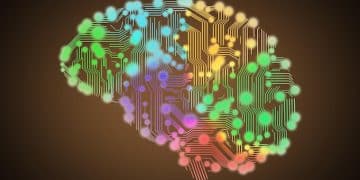AI in Sports: How Teams Leverage Artificial Intelligence for Performance Improvement

How Sports Teams Are Using AI to Improve Performance: A Deep Dive reveals how artificial intelligence transforms athlete training, strategy, and fan engagement through data-driven insights and innovative technologies in the sports sector.
From optimizing training regimes to predicting game outcomes, how sports teams are using AI to improve performance is revolutionizing the industry. Artificial intelligence delivers innovative technologies and data-driven insights.
AI-Driven Performance Enhancement in Sports: An Overview
The integration of artificial intelligence into sports has unlocked capabilities previously unimaginable. From enhancing player performance to revolutionizing fan engagement, AI is rapidly transforming the sports landscape.
This section explores how AI technologies are currently employed by sports organizations to optimize performance, providing a comprehensive overview of the innovative strategies and tools that are reshaping the industry.
Data Analytics and Performance Metrics
AI algorithms analyze vast datasets to extract actionable insights, providing coaches and athletes with a competitive edge.
Personalized Training Programs
AI crafts individualized training regimens tailored to each athlete’s strengths, weaknesses, and specific needs, optimizing their physical and mental development.
- AI identifies patterns in athlete performance data to refine training techniques.
- Predictive models anticipate potential injuries, allowing for proactive intervention and recovery strategies.
- Machine learning algorithms adapt training programs in real-time, maximizing effectiveness and minimizing risks.
- AI-driven feedback systems offer athletes instant insights into their performance, promoting continuous improvement.
In conclusion, the application of AI in performance enhancement represents a paradigm shift in the sports industry, offering data-driven strategies that optimize athlete potential and provide a competitive advantage.
AI in Player Development: Maximizing Potential
Artificial intelligence plays a pivotal role in nurturing talent by offering individualized training plans and detailed performance assessments. AI refines skill development and maximizes potential.
Here, we explore how AI is used in player development, highlighting the techniques, technologies, and real-world examples of AI’s influence on shaping the next generation of sports stars.

AI-Powered Scouting and Recruitment
Advanced AI algorithms assess potential recruits by analyzing extensive datasets from different sources, uncovering hidden talents and lowering scouting expenses.
Virtual Reality Training Simulations
AI-powered virtual reality simulations provide athletes with immersive training settings that mimic real-game situations, improving decision-making and reaction times.
AI evaluates biomechanical movements to maximize performance and identify inefficiencies, ensuring best possible development trajectories for athletes.
AI in player development provides athletes with the tools and insights they need to reach their full potential.
Injury Prevention Through AI: Staying in the Game
AI’s analytical skills are essential for recognizing patterns and predicting injuries before they occur, protecting players’ health and extending careers.
This section examines how AI contributes to injury prevention, discussing the analytical methods, technologies, and data-driven insights that keep athletes healthy and on the field.
- AI algorithms sift through biomechanical and performance data to detect injury risk factors.
- Wearable sensors provide real-time data on athlete physiological metrics, enabling prompt intervention.
- Predictive modeling forecasts potential injuries, facilitating preventative actions and personalized recovery strategies.
- Adaptive training programs utilize AI to modify exercises based on real-time feedback, injury probability reduction.
Through AI, injury prevention evolves from reactive to proactive, mitigating risks and safeguarding athlete welfare via data-driven predictive approaches.
AI in Game Strategy and Tactics: Outsmarting the Opposition
AI is completely changing game strategy and tactics by providing teams with unmatched insights into player performance, opponent behavior, and match circumstances, resulting in data-driven decision-making.
In this section, we explore how AI influences game strategy, discussing the analytical resources, technological breakthroughs, and tactical techniques that give teams a competitive advantage.
Predictive Analytics for Match Outcomes
AI algorithms generate predictive models based on historical data, current circumstances, and opponent analysis to forecast match result to help teams create appropriate tactics.

Real-Time Decision Support for Coaches
During games, AI provides coaches with real-time data and insights, enabling fast, educated decisions that may change the course of the match.
AI-driven game strategy enhances teams’ decision-making abilities, enabling them to outsmart opponents and optimize performance in various match conditions.
Enhancing Fan Engagement with AI: A New Experience
AI develops customized experiences and deeper connections between fans and their favorite teams by enabling customized content delivery, interactive platforms, and personalized marketing strategies.
This section explores how AI is used to engage fans, discussing revolutionary technologies, customized features, and new experiences that foster loyalty and participation.
- AI-driven algorithms personalize content based on user preferences, increasing fan engagement.
- Chatbots and virtual assistants provide real-time support, improving customer satisfaction.
- Using AI technologies to recognize patterns in fan behavior, enables personalized ad campaigns.
- AI identifies social media trends and sentiment, enabling personalized communications and outreach initiatives for businesses.
AI-enhanced fan engagement not only improves the spectator experience, but it also builds the basis for long-term loyalty and support for sports teams.
Ethical Considerations and Future Trends
As AI becomes increasingly integrated into sports, ethical considerations become increasingly crucial to guarantee equitable opportunities, openness, and athlete well-being.
This section explores the moral dimensions of AI in sports, discussing possible advancements, problems, and ideas for using AI in a fair and ethical manner.
Fairness and Transparency in AI Applications
To promote trust and equality, it is essential to create AI applications that are unbiased and transparent.
Data Privacy and Security
Protecting athlete and fan personal data is essential for maintaining integrity and trust in data collection and storage.
Ethical guidelines and regulations are required to ensure that AI is used responsibly and ethically.
AI in sports enhances fairness, promotes transparency, and prioritizes athlete well-being, while unlocking new possibilities and changing the future.
| Key Point | Brief Description |
|---|---|
| 📊 Data Analytics | AI analyzes data to improve performance and strategy. |
| 🧑⚕️ Injury Prevention | AI predicts injuries and optimizes rehab protocols. |
| 🎯 Game Strategy | AI develops game plans based on opponent analysis. |
| 📣 Fan Engagement | AI customizes fan experiences and interactions. |
Frequently Asked Questions
▼
AI analyzes athlete data to create personalized training programs, addressing specific needs and weaknesses, thereby maximizing performance and reducing injury risks.
▼
AI algorithms analyze biomechanical data and physiological metrics to predict potential injuries, enabling proactive interventions and personalized recovery plans for athletes.
▼
AI generates predictive models based on historical data and opponent analysis to forecast match outcomes and create winning strategies, offering real-time decision support for coaches.
▼
AI personalizes content and enhances interactions, ensuring deeper connections, and providing real-time support through chatbots, thereby improving overall satisfaction and loyalty.
▼
Key considerations include ensuring fairness, unbiased algorithms, protecting athlete data privacy, and establishing clear ethical guidelines regulating responsible AI implementation in sports.
Conclusion
In conclusion, how sports teams are using AI to improve performance is changing the landscape by maximizing player potential, refining game plans, and improving fan engagement. Moving ahead with this technology requires careful thought about fairness, privacy, and ethical behavior in order to completely realize AI’s transformative potential.





